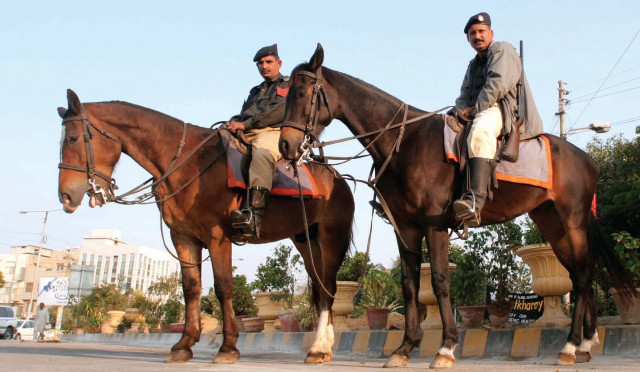Curbing crime on horseback: Prince, Kajal and mounted police struggle to find their place
Horses meant for surveillance are often used by high-ranking police officers for polo.

While the mounted police have no significant role at present, their primary purpose is to provide security in residential areas, disperse rioters and guard important buildings to prevent terrorist activities. However, they are only seen in posh areas killing their time.
Police officers say there are around 29 horses, but most of them are used by high-ranking police officers for polo. “We can’t stop senior police officers and their children from using the horses for the sport,” a senior officer working at the mounted police unit in Karachi said, adding that an additional IG and two DIG level officers frequently use the horses for polo.
The mounted police personnel have much to complain about – no one takes them seriously and no government has given them due attention. They claim they can still play a significant part in surveillance, help curb street crime and terrorist activities.
The officers said the budget allocated for the unit is not released on time and more often than not the full amount is not released. Many ghost officers are given salaries, while others perform their duties for the district police instead.
“The government has allocated around Rs3.6 million for the horses’ ration, but we end up buying food on credit because the budget is not released on time,” said an officer working at the stable in Boat Basin, one of the two major horse stables in Karachi.
At the Boat Basin stable, there are around 18 horses of different breeds. Prince, Kajal, Super Star, Dara, Eagle, Safari, Gulshan, Sanober and Sikander are some of the horses being used by the police.
“The price of horses varies from Rs0.1 million to Rs0.3 million, while the daily expenditure on each horse ranges from Rs350 to Rs400, summing up to around Rs12,000 a month ,” he said.
Caretaker Anwar Ali said different grains and coconut oil are part of the horses’ diet. “The average life of mounted horses is around 18 years after which they are considered retired. Ideally, we should not use the horses after 18 years because they cannot run properly and fall sick frequently,” he said.
Despite this, a few horses have been used for 25 years, which are not fit for security purposes, Ali added.
Besides other problems, there is a severe shortage of police personnel. The entire mounted police unit comprises 31 people, including a DSP, inspector, sub-inspector and some police constables.
DSP Mounted Police Fateh Muhammad Awan says that the police personnel operate in posh areas where he claims street crime has been slightly reduced. Some horses are seen patrolling around Agha’s supermarket, Gulfway market in Clifton and Bilawal House. “We have fixed duties, from 4 to 6 hours a day, with each shift comprising four cops. There are three shifts which patrol the area from morning to late night,” he said.
Earlier there were frequent complaints of purses being snapped, but now such incidents are hardly reported, he claimed. Besides Karachi, all other districts in Sindh have closed their mounted police units because of the “unnecessary” burden it had on the national exchequer.
“Around 200 personnel from the mounted police work in Hyderabad, Sukkur and Jacobabad’s district police. Record shows that 50 to 60 horses are working in the districts and every year budget is allocated for them. However, there are no horses being used and no stables exist for the past many years,” a police officer said.
It was in 1760 that the mounted police started operating in the UK. Later, the British government replicated this method of patrolling in other countries they had colonised. In 1834, mounted police units were established by the British in every district and town of Sindh.
Published in The Express Tribune, December 30th, 2011.



















COMMENTS
Comments are moderated and generally will be posted if they are on-topic and not abusive.
For more information, please see our Comments FAQ